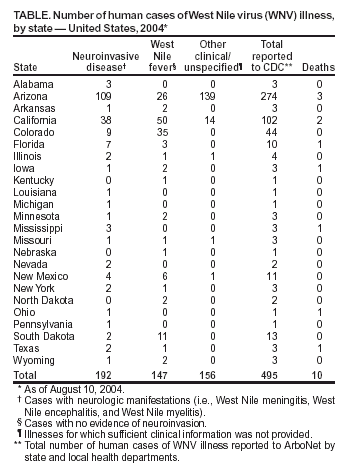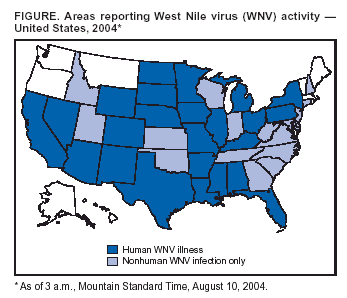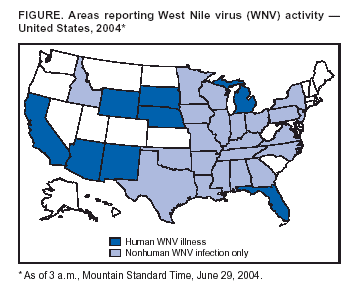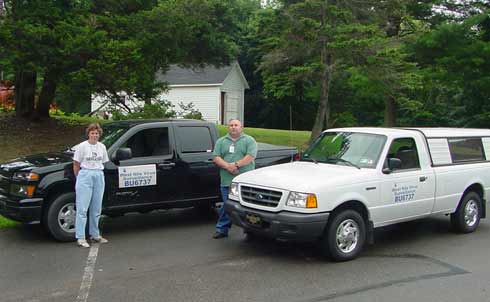2004 WNV Archive
|
2004 WNV Archive
October 11, 2004 - A mosquito adulticiding operation is scheduled for Tuesday, October 12th The adulticiding operation will take place in Piatt Township on Canal Rd on an 8-acre area and in Muncy Creek Township on Angletown Rd on a 10-acre area in the mid-afternoon, weather permitting. The Penn State Extension West Nile Virus Control Program will be conducting a backpack ULV treatment in an area where high mosquito activitiy has been found. If you have any questions, please contact Carol A. Loveland, WNV Technician at (570) 433-3040 (Lycoming County Penn State Extension office).
September 29, 2004 - A mosquito adulticide operation is scheduled for Thursday September 30, 2004 in the following Lycoming County municipalities: Loyalsock Township, Woodward Township, Montoursville Borough, and City of Williamsport between the hours of 6:00 and 8:00 p.m. The application will be truck based fogging in these areas. If you have any questions, please contact Carol A. Loveland, WNV Technician at (570) 433-3040 (Lycoming County Penn State Extension office).
September 23, 2004 - The Pennsylvania Department of Health issued a "Health Advisory" Message #19 today related to WNV and National Instute for Health (NIH) Clinical Trials. Click HERE for more information. The NIH is actively recruiting participants for these studies. There are two sites in PA:
* Lehigh Valley Hospital (Contact Dr. Marcelo Gareca 610-402-8430) and
* West Reading (contact Dr. Robert Jones at 610-374-9523).
If a case occurs far from these sites, or for any reason is not able to be transferred to one of them, the NIH Clinical Center in Bethesda, Maryland can accept the patient, and will transfer him or her at NIH expense.
NIH Clinical Center: Principal Investigator is Amy Guillet Agrawal,MD at (301) 496-9320 (business hours) or at (240) 687-5539 at other times.
September 23, 2004 - A mosquito adulticiding operation is scheduled for Thursday, September 23rd. The adulticiding operation will take place in Woodward Township on Lower Water St on a 5-acre area in the early evening, weather permitting. The Penn State Extension West Nile Virus Control Program will be conducting a backpack ULV treatment in an area where high mosquito activitiy has been found. If you have any questions, please contact Carol A. Loveland, WNV Technician at (570) 433-3040 (Lycoming County Penn State Extension office).
September 7, 2004 - We have been fortunate to have only 1 mosquito pool identified as "positive" so far this year. There have been only 3 humans (in the State) identified with WNV and none in Lycoming County. Since September and October are the high point in the WNV season, we can expect to receive additional "positives" before the season is over. - Les Gruver, Lycoming County EMA Coordinator
COUNTY OF LYCOMING
WEST NILE VIRUS
SCOREBOARD
as of
SEPTEMBER 7, 2004
Surveillance Type # Collected # Tested # Positives
(DEP STATISTICS)
HUMANS 0
DEAD BIRDS 4 4 0
MOSQUITO SAMPLES 688 193 1
SENTINEL SAMPLES 204 204 0
VET SAMPLES n/a n/a 0
Mosquitoes identified at Lab (individual) 18,596
Mosquito Species identified 33
Ochlerotatus trivittatus 7,092
Culex resturans 4,867
Aedes vexans 2,054
Culex pipiens 942
Ochlerotatus canadensis canadensis 546
Culex spp. 513
All others (27) 2,582
DEAD BIRDS SIGHTED AND REPORTED: 43
MUNICIPALITY (+) BIRDS (+) MOSQUITOES (+) VET City of Williamsport ____ 1 ___
TOTAL 0 1 0
Prepared by: Les Gruver, Lycoming County WNV Coordinator, 570-433-4461 Ext. 132.
September 1, 2004 - A mosquito aduliciding operation is scheduled for Wednesday, September 1st. The adulticiding operation for an area of Williamsport will be in the early evening, weather permitting. The Penn State Extension West Nile Virus Control Program will be conducting a backpack ULV treatment on approximately 5 acres of area where very high mosquito counts have been found near an industrial area off of Reach Rd. If you have any questions, please contact Carol A. Loveland, WNV Technician at (570) 433-3040 (Lycoming County Penn State Extension office).
August 30, 2004 - Lycoming County EMA Coordinator Les Gruver announced today that the first West Nile Virus "Positive" mosquito pool in Lycoming County has been identified today in the City of Williamsport. The County WNV Surveillance Team will respond by placing additional mosquito trapping equipment in the designated area and closely monitor the area for the next few weeks.
August 23, 2004 - A mosquito aduliciding operation is scheduled for Monday, August 23rd. The adulticiding operation for an area of Muncy Creek Township will be in the early evening, weather permitting. The Penn State Extension West Nile Virus Control Program will be conducting a backpack ULV treatment on approximately 9 acres of area where very high mosquito counts have been found near a residential neighborhood area. If you have any questions, please contact Carol A. Loveland, WNV Technician at (570) 433-3040 (Lycoming County Penn State Extension office).
August 16, 2004 - An adulticiding operation will take place in Williamsport today, August 16th in a 35-acre area behind the 1500 block of West Third St to Rose St back to Dix St and Walker St. in the early evening, weather permitting. The Penn State Extension West Nile Virus Control Program will be conducting a backpack ULV treatment in an area where very high mosquito counts have been found near a residential neighborhood area. A barrier treatment will also be done in the afternoon. If you have any questions, please contact Carol A. Loveland, WNV Technician at (570) 433-3040 (Lycoming County Penn State Extension office).
COUNTY OF LYCOMING
WEST NILE VIRUS SCOREBOARD
as of
AUGUST 11, 2004
Surveillance Type # Collected #Tested # Positives
(DEP STATISTICS)
HUMANS 0
DEAD BIRDS 4 4 0
MOSQUITO SAMPLES 570 134 0
SENTINEL SAMPLES 156 144 0
VET SAMPLES n/a n/a 0
Mosquitoes identified at Lab (individual) 12,976
Mosquito Species identified 32
Culex resturans 4,640
Ochlerotatus trivittatus 3,512
Aedes vexans 1,370
Culex pipiens 690
Culex spp. 487
Ochlerotatus japonicus japonicus 361
All others (26) 1,916
DEAD BIRDS SIGHTED AND REPORTED 44
MUNICIPALITY (+) BIRDS (+) MOSQUITOES (+)VET
____ ___ ___
TOTAL 0 0 0
Prepared by: Les Gruver, Lycoming County WNV Coordinator, 570-433-4461 Ext. 132.
West Nile Virus Activity -- United States, August 4--10, 2004
(Morbidity and Mortality Weekly Report) During August 4--10, a total of 89 cases of human West Nile virus (WNV) illness were reported from 14 states (Alabama, Arizona, California, Florida, Illinois, Kentucky, Louisiana, Minnesota, Mississippi, Missouri, New Mexico, North Dakota, South Dakota, and Wyoming).
During 2004, a total of 24 states have reported a total of 495 cases of human WNV illness to CDC through ArboNET (Table, Figure). Of these, 274 (55%) cases were reported from Arizona. A total of 281 (58%) of the 495 cases occurred in males; the median age of patients was 51 years (range: 1 month--99 years). Illness onset ranged from April 20 to August 3; 10 cases were fatal.
A total of 46 presumptive West Nile viremic blood donors (PVDs) have been reported to ArboNET in 2004. Of these, 33 (72%) were reported from Arizona, seven from California, three from South Dakota, and one each from Colorado, Iowa, and New Mexico. Of the 46 PVDs, two persons aged 66 and 69 years subsequently had neuroinvasive illness, and seven persons (median age: 55 years; range: 22--72 years) subsequently had West Nile fever.
In addition, during 2004, a total of 2,171 dead corvids and 342 other dead birds with WNV infection have been reported from 35 states. WNV infections have been reported in horses from 24 states (Alabama, Arizona, Arkansas, California, Colorado, Florida, Idaho, Illinois, Iowa, Kentucky, Minnesota, Mississippi, Missouri, Nevada, New Mexico, North Carolina, Ohio, Oklahoma, South Dakota, Tennessee, Texas, Virginia, Wisconsin, and Wyoming) and in a dog from New Mexico. Two unidentified animal species with WNV infection were reported from Illinois and Nevada. WNV seroconversions have been reported in 336 sentinel chicken flocks from seven states (Arizona, California, Delaware, Florida, Louisiana, Nebraska, and Nevada) and in two wild hatchling birds from Ohio. Three seropositive sentinel horses were reported from Puerto Rico. A total of 2,216 WNV-positive mosquito pools have been reported from 27 states (Arizona, Arkansas, California, Colorado, Connecticut, Georgia, Illinois, Indiana, Kansas, Kentucky, Louisiana, Maryland, Michigan, Mississippi, Missouri, Nebraska, Nevada, New Jersey, New Mexico, New York, Ohio, Pennsylvania, South Dakota, Tennessee, Texas, Utah, and Virginia).


July 26, 2004 - The Pennsylvania Department of Health (PADOH) is releasing the following information regarding the appearance of West Nile Virus (WNV) in a human case in Pennsylvania (PA).
The PADOH today reported the first human case of WNV in PA this year. The individual is a 36-year-old male from Bucks County. The fact we have seen the first human infection from WNV reminds all of us that we should take and recommend precautions to help reduce the risk of exposure.
The PADOH, Environmental Protection and Agriculture continue to implement a comprehensive WNV surveillance and control program. In this regard, the state is emphasizing education, source reduction and larval mosquito control. Mosquitoes, sentinel chickens, horses, crows and other wild birds are being monitored for the presence of West Nile virus. The Department of Environmental Protection has awarded grants to counties to carry out mosquito surveillance and control activities. There will be public information campaigns to educate citizens about the need to eliminate mosquito-breeding sites on their property and in their communities, including standing water and tire pile sites. Areas with mosquito larvae problems will be treated with such products as Bacillus thuringiensis israelensis and Bacillus sphaericus. These two products are naturally occurring bacteria found throughout the world. They have shown very low environmental impact when used in mosquito control. If it becomes necessary to implement adult mosquito control, all products used will be EPA-approved products. With these efforts, it is hoped that WNV activity in the Commonwealth will be minimized.
July 19, 2004 - A mosquito aduliciding operation scheduled for last week has been rescheduled for this week. The adulticiding operation for an area of Muncy Creek Township will be Tuesday, July 20th in the early evening, weather permitting. A rain date is tentatively scheduled for Wednesday,July 21st. The Penn State Extension West Nile Virus Control Program will be conducting a backpack ULV treatment on approximately 7 acres of area where very high mosquito counts have been found near a residential neighborhood area. If you have any questions, please contact Carol A. Loveland, WNV Technician at (570) 433-3040 (Lycoming County Penn State Extension office).
July 9, 2004 - A mosquito adulticiding operation is tentatively scheduled for an area of Muncy Creek Township on Wednesday, July 14th in the early evening,weather permitting. A rain date is tentatively scheduled for Thursday, July 15th. The Penn State Extension West Nile Virus Control Program will be conducting a backpack ULV treatment on approximately 6 acres of area where very high mosquito counts have been found near a residential neighborhood area. If you have any questions, please contact Carol A. Loveland, WNV Technician at (570) 433-3040 (Lycoming County Penn State Extension office).
COUNTY OF LYCOMING
WEST NILE VIRUS SCOREBOARD
as of
JULY 6, 2004
Surveillance Type #Collected #Tested #Positives
(DEP STATISTICS)
HUMANS 0
DEAD BIRDS 3 3 0
MOSQUITO SAMPLES 350 46 0
SENTINEL SAMPLES 96 96 0
VET SAMPLES 0
Mosquitoes identified at Lab (individual) 4,970
Mosquito Species identified 29
Culex resturans 1992
Aedes vexans 721
Ochlerotatus trivittatus 626
Ochlerotatus canadensis 288
Ochlerotatus japonicus 226
Ochlerotatus sticticus 223
All others (23) 894
DEAD BIRDS SIGHTED AND REPORTED: 27
Prepared by: Les Gruver, Lycoming County WNV Coordinator, 570-433-4461 Ext. 132.
MUNICIPALITY (+) BIRDS (+) MOSQUITOES (+) VET
____ ___ ___
TOTAL 0 0 0
West Nile Virus Activity --- United States, June 23--29, 2004
(Morbidity and Mortality Weekly Report) As of June 29, eight states had reported a total of 57 human cases of West Nile virus (WNV) illness to CDC through ArboNET in 2004. A total of 38 cases had been reported from Arizona, 10 from California, three from New Mexico, two from Florida, and one each from Michigan, Nebraska, South Dakota, and Wyoming (See map below) Thirty-six (64%) of the cases occurred in males; the median age of patients was 53 years (range: 9--84 years), and dates of illness onset ranged from April 23 to June 15. Of the 57 cases, one fatal case was reported from Arizona.
A total of 13 presumptive West Nile viremic blood donors (PVDs) have been reported to ArboNET. Of these, 12 were reported from Arizona, and one was reported from New Mexico. Of the 13 PVDs reported to ArboNET, one person aged 69 years subsequently had neuroinvasive illness, and three persons aged 22, 51, and 52 years subsequently had West Nile fever. In New Mexico, the first detected WNV activity in 2004 was in a PVD; in Arizona, three of the first seven reported human WNV infections in 2004 were in PVDs.
In addition, during 2004, a total of 760 dead corvids and 85 other dead birds with WNV infection have been reported from 23 states, and 42 WNV infections in horses have been reported from 11 states (Alabama, Arizona, California, Idaho, Missouri, North Carolina, Oklahoma, South Dakota, Tennessee, Texas, and Virginia). WNV seroconversions have been reported in 89 sentinel chicken flocks from four states (Arizona, California, Florida, and Louisiana). Three seropositive sentinel horses were reported from Puerto Rico. A total of 180 WNV-positive mosquito pools have been reported from 11 states (Arizona, California, Illinois, Indiana, Louisiana, Michigan, Missouri, New Jersey, Pennsylvania, Texas, and Virginia).
Additional information about national WNV activity is available from CDC at http://www.cdc.gov/ncidod/dvbid/westnile/index.htm and at http://westnilemaps.usgs.gov.

WEST NILE VIRUS SEASON 2004
Since the West Nile Virus season began on April 1, the Lycoming County WNV Surveillance team has been busy collecting samples of larvae and adult mosquitoes. These samples are then sent to the State lab for identification and testing. The emphasis, this year, is more toward the treatment of suspected high-density mosquito areas rather than the collection of great quantities of samples. Along with mosquito sampling, the County also has a flock of sentinel chickens that are tested each week for indications of West Nile Virus. Information relating to tests results for Lycoming County as well as the State can be found through the PA Department of Health internet web site: www.westnile.state.pa.us. Our county surveillance team members are Carol Loveland and Steve Ryder (Pictured Below). The County West Nile Virus Task Force continues to meet every month to keep informed of the specific sample collection, testing and treating activities throughout the County.

COUNTY OF LYCOMING
WEST NILE VIRUS SCOREBOARD
as of
JUNE 23, 2004
Surveillance Type # Collected #Tested #Positives
(DEP STATISTICS)
HUMANS 0
DEAD BIRDS 3 2 0
MOSQUITO SAMPLES 251 28 0
SENTINEL SAMPLES 60 60 0
VET SAMPLES 0
Mosquitoes identified at Lab (individual) 3,298
Mosquito Species identified 28
Culex resturans 985
Aedes vexans 644
Ochlerotatus trivittatus 364
Ochlerotatus canadensis 279
Ochlerotatus sticticus 219
All others (23) 807
DEAD BIRDS SIGHTED AND REPORTED 23
MUNICIPALITY (+) BIRDS (+) MOSQUITOES (+)VET
____ ___ ___
TOTAL 0 0 0
Prepared by: Les Gruver, Lycoming County WNV Coordinator, 570-433-4461 Ext. 132.
COUNTY OF LYCOMING
WEST NILE VIRUS SCOREBOARD
as of
JUNE 8, 2004
Surveillance Type # Collected #Tested # Positives
(DEP STATISTICS)
HUMANS 0
DEAD BIRDS 1 1 0
MOSQUITO SAMPLES 212 21 0
SENTINEL SAMPLES 48 36 0
VET SAMPLES 0
Mosquitoes identified at Lab (individual) 1,600
Mosquito Species identified 27
Culex resturans 444
Aedes vexans 313
Ochlerotatus canadensis 274
Ochlerotatus japonicus 141
Ochlerotatus excrucians 107
All others (22) 321
DEAD BIRDS SIGHTED AND REPORTED: 12
MUNICIPALITY (+) BIRDS (+) MOSQUITOES (+) VET
____ ___ ___
TOTAL 0 0 0
Prepared by: Les Gruver, Lycoming County WNV Coordinator, 570-433-4461 Ext. 132.
June 1, 2004 - CDC West NileVirus webpage provides the latest details about WNV. This page includes general facts, Q&As, case counts, and maps of WNV activity. April 26, 2004 - 2004 West Nile Virus Activity in the United States Offers the latest information on West Nile Virus (WNV) activity.
http://www.cdc.gov/ncidod/dvbid/westnile/index.htm
2004 West NileVirus Activity in the United States:UPDATED information on West Nile virus (WNV) activity in the United States. Two human WNV cases have occurred as of June 1, 2004. Of the two cases, one was reported as West Nile fever (milder disease), the other was reported as West Nile meningitis or encephalitis (neuroinvasive disease) and none were clinically unspecified at this time.
http://www.cdc.gov/ncidod/dvbid/westnile/surv&controlCaseCount04_detailed.htm
2004 West NileVirus Map: The WNV maps are updated regularly to reflect surveillance reports released by state and local health departments to CDC. Map shows the distribution of avian, animal, or mosquito infection occurring during 2004 with number of human cases if any, by state. If West Nile virus infection is reported to CDC in any area of a state, that entire state is shaded accordingly.
http://www.cdc.gov/ncidod/dvbid/westnile/surv&control04Maps.htm
One human WNV case occurring during 2004 has been reported in Ohio as of April 21, 2004. The case was reported as West Nile meningitis or encephalitis (neuroinvasive disease).
http://www.cdc.gov/ncidod/dvbid/westnile/surv&controlCaseCount04_detailed.htm
April 12, 2004 - The Pennsylvania Department of Health (PADOH) is releasing the following information in preparation for the beginning of the 2004 West Nile Virus (WNV) season.
In 2003, the Centers for Disease Control and Prevention (CDC) reported 9175 human cases and 230 deaths (as of March 10, 2004) of WNV in the United States. In Pennsylvania, 237 human cases of WNV and eight deaths were reported to the Department of Health. To date, the virus has been detected throughout the United States except in WA, OR, AK and HI. In Pennsylvania, all 67 counties had WNV detected either in birds, mosquito pools, sentinel chickens, horses or humans. Some counties had positives in all surveillance areas. Because these findings indicate ongoing and widening enzootic transmission, we need to be vigilant and prepared for the re-emergence of WNV as the adult mosquito season progresses. As we enter a new mosquito season, PADOH wants to keep you apprised of our surveillance activities and how you can help the Commonwealth deal with this emerging disease threat.
The PA Departments of Health, Environmental Protection and Agriculture continue to implement a comprehensive WNV surveillance and control program. In this regard, we are emphasizing education, source reduction and larval mosquito control. Mosquitoes, sentinel chickens, horses, crows and other wild birds are being monitored for the presence of West Nile virus. The Department of Environmental Protection has awarded grants to counties to carry out mosquito surveillance and control activities. There will be public information campaigns to educate citizens about the need to eliminate mosquito-breeding sites on their property and in their communities, including standing water and tire pile sites. Areas with mosquito larvae problems will be treated with such products as Bacillus thuringiensis israelensis and Bacillus sphaericus. These two products are naturally occurring bacteria found throughout the world. They have shown very low environmental impact when used in mosquito control. If it becomes necessary to implement adult mosquito control, all products used will be EPA-approved products. With these efforts, it is hoped that WNV activity in the Commonwealth will be minimized.
PADOH asks the following of you and your colleagues:
1. Please review the following information to assist you in evaluating suspected human cases of WNV.
2. PADOH encourage you to submit all WNV-related specimens to PADOH's Public Health State Laboratory in Lionville. Enclosed are instructions for submitting specimens. Laboratory testing is performed free-of-charge and the turn-around time is very short.
3. CDC has issued guidelines for infants born of West Nile infected mothers. The article can be viewed at <http://www.cdc.gov/mmwr/preview/mmwrhtml/mm5307a4.htm>. .
Please share this information with appropriate personnel in your facility or practice. If you have questions or need additional information, please log onto our West Nile website at www.westnile.state.pa.us <http://www.westnile.state.pa.us/>. You can also call 1-877-PA HEALTH or the Division of Infectious Disease Epidemiology at 717-787-3350, or you may contact or Arbovirus Coordinator, Dr. Marjorie Ebenezer, MD, MPH at mebenezer@state.pa.us mailto:mebenezer@state.pa.us
2003 WNV ARCHIVE
What is West Nile Virus? West Nile virus is a mosquito-borne infection that can cause brain inflammation. The virus was previously only found in Africa, Eastern Europe and West Asia, but was detected in Pennsylvania for the first time in the year 2000. West Nile virus infection in people occurs primarily in the late summer or early fall. People can get infected from the bite of certain kinds of mosquitoes, such as the Northern house mosquito, that are infected with the virus. Mosquitoes get it when they bite or take a blood meal from birds infected with the West Nile virus. Those mosquitoes then transmit the virus to people, animals, and other birds when biting to take blood. You can reduce the number of mosquitoes around your home and neighborhood by reducing the amount of standing water available for mosquito breeding.
What are the symptoms of West Nile? The incubation period of a West Nile virus infection in humans is usually 5 to 15 days. Most people who are infected by the West Nile Virus either have no symptoms or mild illness such as fever, headache, or body ache, before fully recovering. Some people may also experience a mild skin rash, or swollen lymph glands. A more severe infection may be marked by a severe headache, high fever, stiff-neck, stupor, disorientation, coma, tremors, convulsions, muscle weakness, paralysis, and occasionally death.
Who is at greatest risk? All residents of areas where virus activity has been identified are at risk of getting West Nile. People over age 50 have the highest risk of severe illness because of their weakening immune system, although anyone with a compromised immune system is at risk. All who died in 1999 and 2000 were over 68 years of age.
What is the Treatment for WNV? There is no vaccine to protect people from the West Nile encephalitis virus, nor is there a specific treatment, medication, or cure. However, the symptoms and complications of the disease can be treated. Severe cases may call for hospitalization, intravenous (IV) fluids and nutrition, airway management, ventilatory support, and prevention of secondary infections such as pneumonia.
DEAD BIRD REPORTING & MEDICAL INFORMATION
PA DOH (TOLL FREE) 1-877-PA HEALTH
STATE MOSQUITO SURVEILLANCE & PROGRAM INFORMATION
PA DEPT. ENVIRONMENTAL PROTECTION (DEP) 570-327-3636
LYCOMING COUNTY MOSQUITO SURVEILLANCE & PROGRAM INFORMATION
LES GRUVER, WNV PROGRAM COORDINATOR - 570-433-4461 (EXT.132)
TOM MURPHY, WNV SURVEILLANCE TEAM COORDINATOR - 570-433-3040
WEB LINKS . . .
Website of the Animal & Plant Health Inspection Service. WNV and how it spreads, Clinical Signs of WNV in horses, Protecting your animals, suggested vaccination, and more!
Type in: WEST NILE VIRUS To search for related information. This site has over 13,522 Docuemnts.
Thanks to the PennState Agricultural Sciences for the WNV info. listed above
| For more information contact: |
| |
| Name: |
Wendy Hastings |
| Title: |
EMS Program Manager |
| Email: |
wendy.hastings@lyco.org |
| Voice: |
570-433-4461 |
| Fax: |
570-433-4435 |
|
|
|
|
|